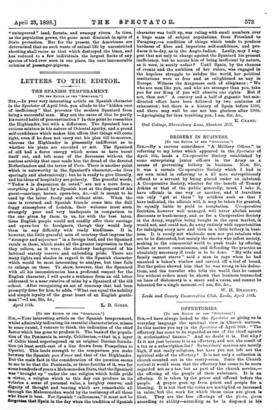LETTERS TO THE EDITOR.
THE SPANISH TEMPERAMENT.
[To THE EDITOR 07 THE " BpscraTos."]
n, In your very interesting article on Spanish character in the Spectator of April 16th, you allude to the " hidden root 'of inefficiency" that prevents the modern Spaniard from being a successful man. May not the cause of this be partly his rooted habit of procrastination P In this point he resembles the Highlander, but with a difference. The Spaniard has a curious mixture in his nature of Oriental apathy, and a proud self-confidence which makes him affirm that things will come Tight, even if he does not carry out his plan till to-morrow, whereas the Highlander is pleasantly indifferent as to whether his plans are executed or not. The Spaniard of old had a fierce energy which seems to have burnt itself out, and left some of the fierceness without the -restless activity that once made him the dread of the devoted Netherlanders and the terror of Peru. There is another point which is noteworthy in the Spaniard's character,—he lives sparingly and abstemiously ; but he is ready to give liberally, and his ideas of hospitality are princely. The graceful words,
Todoa it in disposition de usted," are not a mere form ; ,everything is placed by a Spanish host at the disposal of his guest—carriage, horses, opera-box, &c.—all is meant to be used by the latter freely and without stint. When the case is reversed and Spanish friends come into the dull foggy atmosphere of London, their welcome must seem strangely poor and very inadequate in comparison to the one given by them to us, for with the beet inten- tions English people would not readily offer their• carriage and opera-box to foreigners, though they would help them in any difficulty with ready kindliness. It is, however, the little graceful acts of courtesy that impress the ." stranger and sojourner" in a foreign land, and the Spaniard excels in these, which make all the greater impression in that they relieve, as it were, the shadowy background of his habitual stately reserve and unbending pride. There are many lights and shades in regard to the Spanish character 'which would be most interesting to analyse, but time fails to enlarge on these. To show, however, that the Spaniard with all his inconsistencies has a profound respect for the English character, I will quote a sentence from an old letter addressed to a near relative of mine by a Spaniard of the old -school. After recognising an act of courtesy that had been promptly done for him, he adds, " What can equal the nobility and simple loyalty of the great heart of an English gentle- man !"—I am, Sir, &c.,
April 16th. L. B. GIBBS.
[To THE EDITOR or THE "SPECTATOR."]
Sin.,—Your interesting article on the Spanish temperament, whilst admirably indicating its essential characteristics, misses to some extent, I venture to think, the indication of the chief factor which has gone to produce it. The basis of the popula- tion of the Peninsula is, surely, Celtiberian,—that is, a layer of Celtic blood superimposed on an original Iberian founda- tion (at least south-east of a line drawn from Pampeluna to Oporto). This lends strength to the comparison you make 'between the Spanish pun d'onor and that of the Highlander. But the main fact in the consideration of the question seems to me to be that the Peninsula, or three-fourths of it, was for some hundreds of years a Mahommedan State, that the Spaniard was "brought up " under the one religion which holds pride a virtue, a 'religion which to this day can produce in its votaries a sense of personal value, a haughty reserve, and dignity of thought and bearing which are remarkable all through the Mahommedan world by the testimony of all those tiro know it beet. For Spanish " callousness," it must not be forgotten that Spain in the day when the tradition of Spanish
character was built up, was ruling with small numbers over a huge mass of subject populations, from Friesland to Paraguay,—a condition of things which tends to produce hardness of fibre and imperious self-eonfidenoe, and pro- duces it to-day, as in the Anglo-Indian. Lastly, may I sug- gest that not only to charge against the Spaniard his present inefficiency, but to accuse him of being inefficient by nature, as it were, is surely unfair P Until Spain, by the chances of events and the ambition of her rulers, was engaged in the hopeless struggle to subdue the world, her political institutions were as free and as enlightened as any in Europe. Witness the Aragonese oath of allegiance : " We who are men like you, and who are stronger than you, take you for our King if you will observe our rights. But if not, then not." A century and a half of gigantic but mis- directed effort have been followed by two centuries of exhaustion ; but there is a history of Spain before 1500, and there may well be one not less glorious after 1900. —Apologising for thus troubling you, I am, Sir, &c.,
E. CRA.BB. Owl Cottage, Shrewsbury Lane, Shooters Hill.


































 Previous page
Previous page